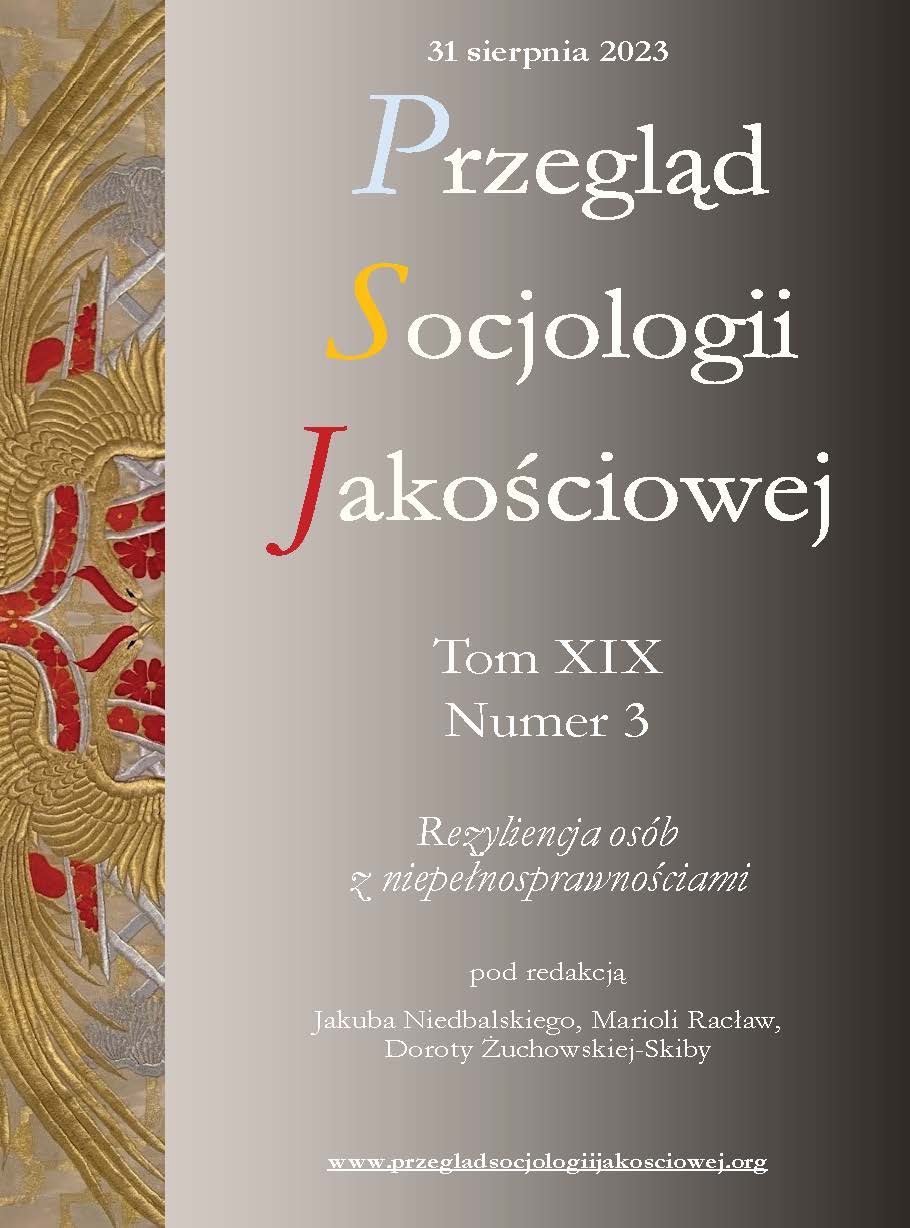Trolls at School: A Story about the Stages of Positive Labeling of People with Disabilities Through Micro-Interactions
DOI:
https://doi.org/10.18778/1733-8069.19.3.02Keywords:
integration through art, evaluation, sensitizing concepts, positive labeling, theatre pedagogyAbstract
The evaluation of the pedagogical-theatrical project Trolls is a source of data on the basis of which we propose the use of positive labeling categories. We expanded it by naming the stages of this form of labeling: bewilderment, taming, initiation, and inclusion. We described the social consequences of gradually becoming familiar with differences, including and placing people with disabilities in the center. We showed how the labeling mechanism was used in artistic-educational activities and redirected toward a discussion of the values of social diversity.
Trolls is a play and workshop created by the Theatre 21 Foundation. It is aimed at primary school students and conducted in classrooms. Through explicit observations, and by referring to the relations between theater educators and actors and class teachers, we examined what the visit of the titular trolls, or actors from Theatre 21, most of whom have Down syndrome or autism, brings to the school and how these actions resonate with the participants.
Owing to the processual character of the evaluation, we were able to discover new research categories. Our research was of an abductive nature. Sensitizing concepts enabled the development of the main category of positive labeling.
Downloads
References
Babicka Maria, Kalinowska Katarzyna, Zalewska-Królak Aleksandra (2019), Przenikanie przez szczeliny – Teatr 21 w szkole. Raport z ewaluacji projektu O!Swój, Warszawa: Fundacja Teatr 21.
Google Scholar
Becker Howard S. (1963), Outsiders: Studies in the sociology of deviance, New York: Harper Collins Publishers.
Google Scholar
Berger Peter, Luckmann Thomas (1967), The Social Construction of Reality: A Treatise in the Sociology of Knowledge, Garden City–New York: Doubleday.
Google Scholar
Blumer Herbert (1986), Symbolic Interactionism: Perspective and Method, Berkeley: University of California Press.
Google Scholar
Czarnowski Stefan (1956), Kult bohaterów i jego społeczne podłoże: Święty Patryk, bohater narodowy Irlandii?, [in:] Stefan Czarnowski (ed.), Dzieła, vol. IV, Warszawa: Państwowe Wydawnictwo Naukowe.
Google Scholar
Dąbrowski Kazimierz (1967), Personality Shaping Though Positive Disintegration, Boston: Little Brown.
Google Scholar
Erikson Kai T. (1962), Notes on the Sociology of Deviance, “Social Problems”, vol. 9(4), pp. 307–314.
Google Scholar
Garland-Thomson Rosemarie (2020), Gapienie się, czyli o tym, jak patrzymy i jak pokazujemy siebie innym, Warszawa: Fundacja Teatr 21.
Google Scholar
Godlewska-Byliniak Ewelina (ed.) (2017), Odzyskiwanie obecności. Niepełnosprawność w teatrze i performansie, Warszawa: Fundacja Teatr 21.
Google Scholar
Godlewska-Byliniak Ewelina, Lipko-Konieczna Justyna (2016), 21 myśli o teatrze, Głogowo: Fundacja Win-Win.
Google Scholar
Godlewska-Byliniak Ewelina, Lipko-Konieczna Justyna (eds.) (2018), Niepełnosprawność i społeczeństwo. Performatywna siła protestu, Warszawa: Fundacja Teatr 21, Biennale Warszawa.
Google Scholar
Goffman Erving (1956), Presentation of Self in Everyday Life, London: Penguin Books.
Google Scholar
Goffman Erving (1963), Stigma. Notes on the Management of Spoiled Identity, London: Penguin Books.
Google Scholar
Kalinowska Katarzyna (2018), Wchodzenie „tylnym wejściem” jako wariant zmiany społecznej. Raport z ewaluacji projektu O!Swój. Edycja 2018, Warszawa: Fundacja Teatr 21.
Google Scholar
Kalinowska Katarzyna, Rożdżyńska-Stańczak Kaja (2017), Jak się zerwie izolację, to kogoś może kopnąć prąd. Raport z ewaluacji projektu O!Swój, Warszawa: Fundacja Teatr 21.
Google Scholar
Kalinowska Katarzyna, Rożdżyńska Kaja (2020), Separujące i ochronne funkcje izolacji. Narzędzia oswajania inności na przykładzie działalności artystyczno-edukacyjnej Teatru 21, “Przegląd Socjologii Jakościowej”, vol. XVI, no. 2, pp. 80–101.
Google Scholar
Kaufmann Jean-Claude (2013), Kiedy Ja jest innym, Warszawa: Oficyna Naukowa.
Google Scholar
Kietlińska Bogna (2019), Nie ma wolności bez samodzielności. Działanie Teatru 21 w perspektywie zmiany, Warszawa: Fundacja Teatr 21.
Google Scholar
Kłoskowska Antonina (1971), Heroizm i personalne symbole wartości kulturowych, [in:] Janusz Kuczyński (ed.), Filozofia i pokój, Warszawa: Państwowe Wydawnictwo Naukowe, pp. 37–54.
Google Scholar
Krajewski Krzysztof (1983), Podstawowe tezy teorii naznaczania społecznego, “Ruch Prawniczy, Ekonomiczny i Socjologiczny”, vol. XLV(1), pp. 225–245.
Google Scholar
Kwaśniewski Jerzy (1976), Pozytywna dewiacja społeczna, “Studia Socjologiczne”, no. 3(62), pp. 215–233.
Google Scholar
Kwaśniewski Jerzy (2012), Czy istnieje dewiacja społeczna?, “Prace Instytutu Profilaktyki Społecznej i Resocjalizacji”, no. 19, pp. 63–88.
Google Scholar
Lemert Edwin M. (1951), Social Pathology: A Systematic Approach to the Theory of Sociopathic Behaviour, New York: McGraw-Hill Book Co.
Google Scholar
Lemert Edwin M. (1967), Human Deviance, Social Problems and Social Control, Englewood Cliffs: Prentice-Hall Inc.
Google Scholar
Mead George Herbert (1909), Social Psychology as Counterpart to Physiological Psychology, “Psychological Bulletin”, no. 6, pp. 401–408.
Google Scholar
Ossowska Maria (1973), Ethos rycerski i jego odmiany, Warszawa: Państwowe Wydawnictwo Naukowe.
Google Scholar
Pyszczek Grzegorz (2012), Jerzego Kwaśniewskiego pochwała dewiacji pozytywnej, “Normy, Dewiacje i Kontrola Społeczna”, no. 13, pp. 139–160.
Google Scholar
Scheff Thomas Jefferson (1966), Being Mentally Ill, London: Aldine Publishing Company.
Google Scholar
Schur Edwin M. (1969), Reactions to Deviance: A Critical Assessment, “American Journal of Sociology”, vol. 75(3), pp. 309–322.
Google Scholar
Tannenbaum Frank (1938), Crime and the Community, Boston: Ginn and Company.
Google Scholar
Teatr 21 (n.d.), Idea, https://teatr21.pl/idea (accessed: 26.02.2023).
Google Scholar
Teatr 21 (n.d.), https://teatr21.pl (accessed: 26.02.2023).
Google Scholar
Teatr 21 (n.d.), O!SWÓJ / 2017–2019, https://teatr21.pl/oswoj-2017-2019-projekt/ (accessed: 26.02.2023).
Google Scholar
Teatr 21 (n.d.), Sezon GAP SIĘ!, https://teatr21.pl/sezon-gap-sie/ (accessed: 26.02.2023).
Google Scholar
Teatr 21 (n.d.), Trolle, https://teatr21.pl/show-item/trolle/ (accessed: 26.02.2023).
Google Scholar
Thompson Gregory A. (2014), Labeling in Interactional Practice: Applying Labeling Theory to Interactions and Interactional Analysis to Labeling, “Symbolic Interaction”, vol. 37(4), pp. 458–482.
Google Scholar
Znaniecki Florian (1974), Ludzie teraźniejsi a cywilizacja przyszłości, Warszawa: Państwowe Wydawnictwo Naukowe.
Google Scholar
Published
Versions
- 2023-10-27 (2)
- 2023-08-31 (1)
How to Cite
Issue
Section
License

This work is licensed under a Creative Commons Attribution-NonCommercial-NoDerivatives 4.0 International License.














